REPRINTED WITH PERMISSION FROM THE CHRISTIAN SCIENCE MONITOR
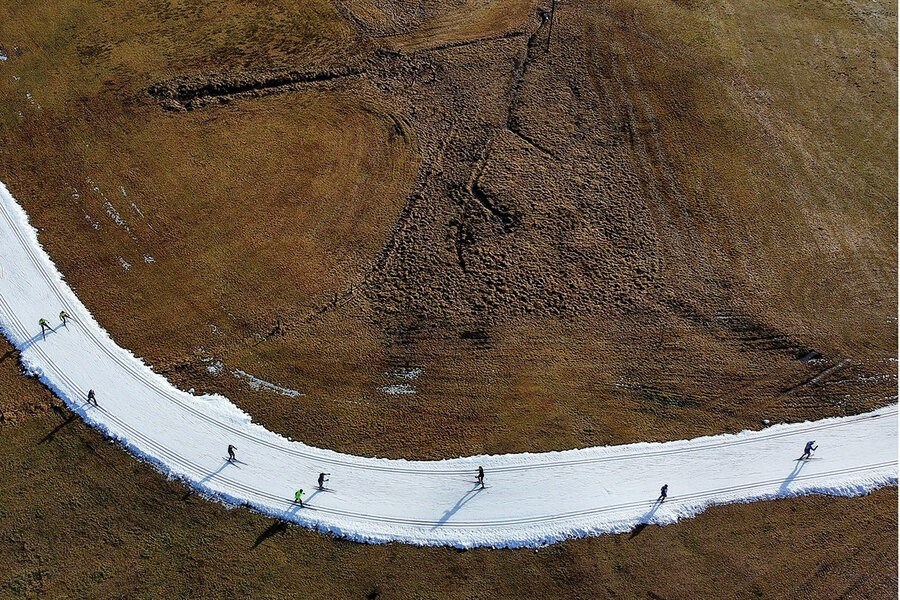 People ski on a cross country slope in Ramsau, Austria, Jan. 6, 2023. Sparse snowfall and warm weather are preventing many European mountaintops from reaching their normal snow levels. Matthias Schrader/AP
People ski on a cross country slope in Ramsau, Austria, Jan. 6, 2023. Sparse snowfall and warm weather are preventing many European mountaintops from reaching their normal snow levels. Matthias Schrader/AP
March 28, 2023
It’s been years now that Hilary Hutcheson has known her rivers were changing. When she first started guiding in northern Montana, there were at least 50 glaciers melting into the waterways of Glacier National Park, she says. Today, there are only half that many, and the rivers where she fly-fishes are warmer and shallower.
Many days during her season, the state imposes what are called “hoot owl” restrictions, which require fishers to be off the water by 2 p.m. if river temperatures have risen to 73 degrees Fahrenheit for three consecutive days. The goal is to avoid adding even more stress on trout and other river species who are already struggling with water temperatures well above their natural comfort levels.
Hoot owl is an economic burden on guides like Ms. Hutcheson. But those involved in the fisheries – from her conservative neighbors to the politically diverse customers at her fly shop to other staunchly independent guides like her – realize the rule is also essential to protect their ecosystems in the face of a changing climate.
“In the fly-fishing industry, what I see, and what I hear, is that the climate crisis is not just a fact but a definite moving point for us,” she says. Rallying around climate action “is not an ostracizing thing in our communities. It shows that you care about fisheries, and that’s it.”
That sentiment is increasingly widespread among people who work and play outside. To kayakers like Adam Cramer, CEO of the nonprofit group Outdoor Alliance, who has witnessed climate-forced changes in his rivers; to businesspeople like former Sugarbush ski resort owner and Merrill Lynch executive Win Smith, who has watched Vermont winters become increasingly erratic; and to hunters, mountain bikers, and snowboarders who are noticing changes to their beloved landscapes, climate change has become less of a partisan issue and more of a rallying cry that is bringing people together.
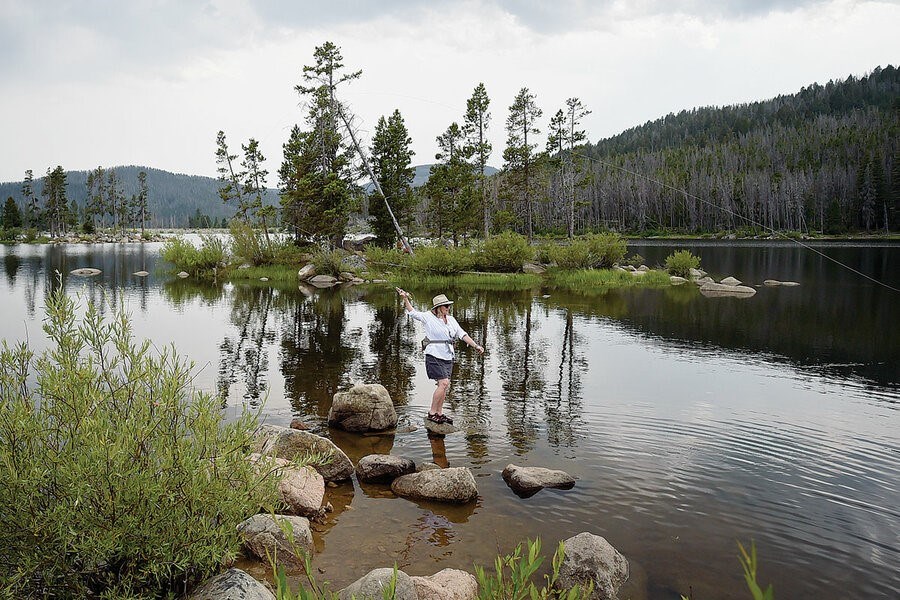 Thom Bridge/Independent Record/AP/FileAmy Glascock sends a cast across Park Lake in Montana during a fishing trip organized by Last Chance Fly Gals, July 31, 2018.
Thom Bridge/Independent Record/AP/FileAmy Glascock sends a cast across Park Lake in Montana during a fishing trip organized by Last Chance Fly Gals, July 31, 2018.
And gradually, say some advocates and lawmakers, this broad coalition of outdoorspeople is convincing their representatives in Washington and in statehouses across the country to treat it the same way.
“The outdoors is a way to open up conversation” about climate, says Lindsay Bourgoine, the vice president of programs at Protect Our Winters, a climate advocacy organization founded by snowboarder Jeremy Jones in 2007 that promotes a “cross-partisan” approach to climate change. “It’s a way to talk about common ground,” Ms. Bourgoine adds.
While few expect wholehearted, bipartisan agreement on global warming – about either causes or solutions – many say the debate around climate change has made a marked turn from focusing on whether it exists to how to deal with it, and how fast.
That includes questions about the role of proposed technical solutions such as carbon capture, which promises to remove greenhouse gases from the atmosphere or trap them at power plants before they go into the air. (Republicans tend to see carbon capture as a key climate solution and a way to allow for some continued fossil fuel burning, while Democrats tend to point out that it is still hugely expensive and unproven at scale and argue that it’s more effective to focus on lowering emissions in the first place.) There is also a large and growing partisan debate over the role of natural gas and whether it should be considered a “green” fuel. (Again, Republicans tend to say yes, Democrats no.)
In general, liberals prefer behavior changes and connect energy security with a rapid movement toward replacing oil, gas, and coal with wind, solar, and other zero-carbon energy sources. Most conservatives favor solutions that tap next-generation technologies, and invoke energy security as a key reason for transitioning more slowly from fossil fuels.
But to many outdoorspeople, these partisan details matter less than the fact that politicians are focusing on climate in the first place.
“It doesn’t matter to me if they’re a Democrat or a Republican,” Ms. Hutcheson says. “I’m looking at the policy and not the politicians. I’m looking at whether they are a champion for the outdoors or not.”
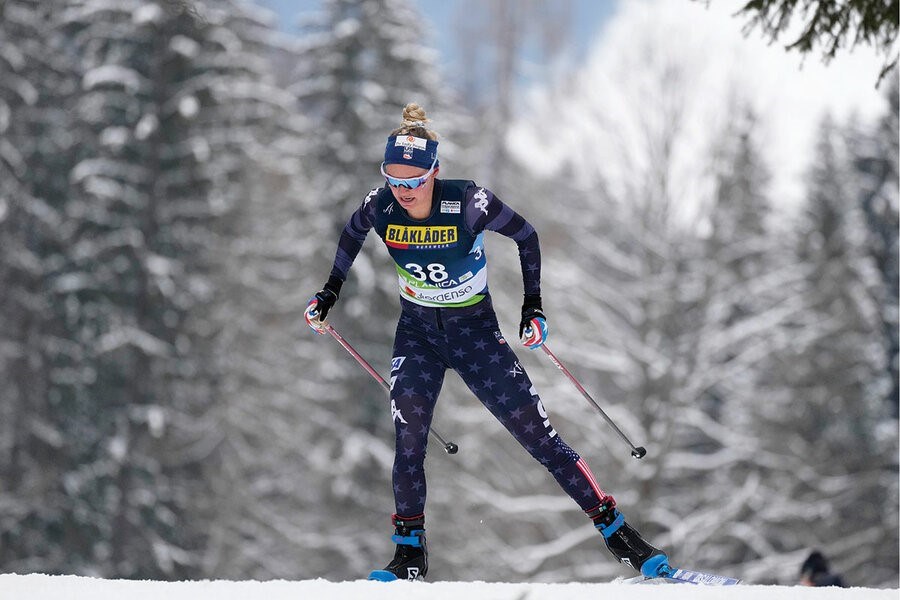 Darko Bandic/APJessie Diggins skis to gold at the world championships in Planica, Slovenia, Feb. 28, 2023.
Darko Bandic/APJessie Diggins skis to gold at the world championships in Planica, Slovenia, Feb. 28, 2023.
Last spring as the Democrat-controlled Congress was weighing major climate legislation, Olympic cross-country skier and Protect Our Winters ambassador Jessie Diggins met with a new caucus of GOP lawmakers interested in shaping climate solutions.
Ms. Diggins is the most successful U.S. Nordic skier in history. From her first medal at the world championships a decade ago to her Olympic gold in 2018 to her individual gold at worlds this year – all firsts for America – she has used her growing platform to speak out on climate change.
“I know that looking for bipartisan solutions is tricky and can be frustrating, and conditions are not perfect,” Ms. Diggins told the group, comparing their ordeal to hers when she battled food poisoning in the Olympic 30-kilometer race two months earlier – and won a silver medal. “But all we’re asking is to show up and get to that finish line knowing that you really have done your best.”
Ms. Diggins has made multiple lobbying trips to Washington over the past five years, often with other athletes. Last spring, that included fellow Protect Our Winters ambassador David Wise, a two-time Olympic champion in freestyle skiing and an ardent hunter.
Winter athletes, Ms. Diggins has said, are the “canaries in the coal mine” when it comes to climate change. She and other top racers are increasingly finding themselves racing on ribbons of manufactured snow in a warming Europe. They stride through slush against a backdrop of green grass, or glide past Alpine vistas in cutoff Lycra tights to cope with temperatures well into the 50s Fahrenheit.
“We see [climate change] happening all over the world, and it affects everyone at every level,” she told representatives during a 2018 briefing for lawmakers. “I see man-made snow everywhere we go – nobody can count on natural snow anymore. It’s a sign we really need to do something. Climate change is taking away a very healthy, incredibly fun, family-oriented sport that I love.”
Ms. Diggins says she recognizes that there isn’t always agreement across party lines on how to solve the climate crisis. But she was heartened that the conservative caucus acknowledged that it was a problem caused by humans and seemed invested in addressing it when she talked with them in Washington, she says.
“It was for me a really uplifting visit. It gave me a lot of hope,” she said during a U.S. Ski Team media call.
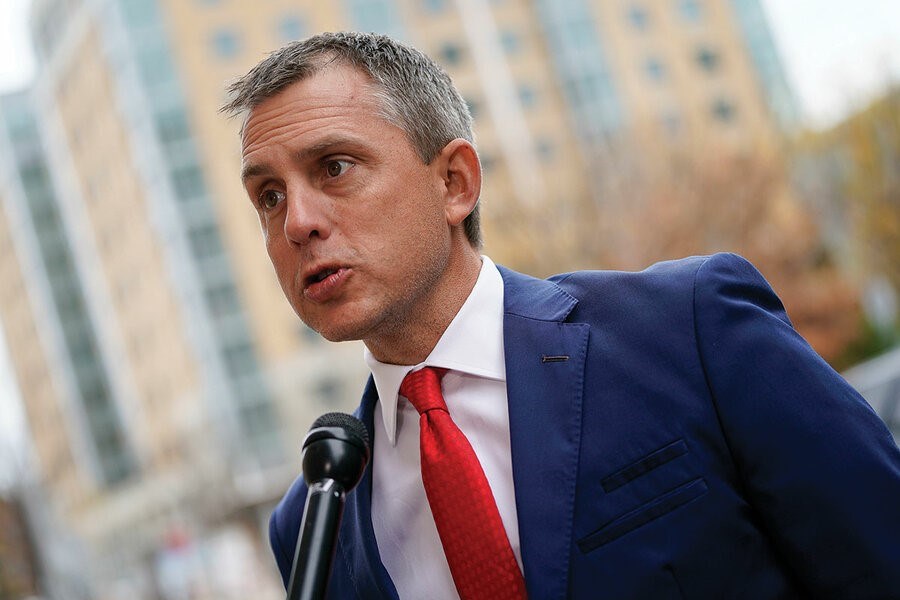 Pablo Martinez Monsivais/AP/FileGOP Rep. Kelly Armstrong of North Dakota is a member of the Conservative Climate Caucus.
Pablo Martinez Monsivais/AP/FileGOP Rep. Kelly Armstrong of North Dakota is a member of the Conservative Climate Caucus.
The GOP group hosting Ms. Diggins reflects a shift in Republican attitudes on climate – due in part to a desire to shape the conversation about how best to preserve the natural beauty they love, too. It was founded by Utah GOP Rep. John Curtis, whose 3rd Congressional District includes the outdoorsy city of Provo – where he served as mayor – and a slew of natural recreation destinations.
Early in his congressional tenure, Mr. Curtis held a town hall – on a 15-mile hike up Mount Timpanogos, a nearly 12,000-foot mountain in the state’s Wasatch Range. It was a chance, he explained, for constituents to join him and talk about ways they could all be better stewards of the Earth – something he sees as a decidedly Republican cause, going back to Teddy Roosevelt’s establishment of the national parks system.
Among those who took him up on it: volunteers with Citizens’ Climate Lobby, a nonpartisan group that supports hundreds of local chapters, all of which work to develop solutions to climate change that fit with local culture and politics. It didn’t take long for members of the group to realize that Mr. Curtis shared their deep appreciation for the natural beauty of their state, and that he agreed action needed to happen on climate change.
“It’s such a different conversation when you’re out for a six-hour hike,” says Tom Moyer, a volunteer state coordinator with Citizens’ Climate Lobby who has been on a number of subsequent hikes with Mr. Curtis, discussing everything from the ground source heat pump in the congressman’s new home to methane mitigation.
After several of these hikes, Mr. Curtis had a crazy idea: What if he invited fellow GOP lawmakers to come to a climate summit with this natural beauty as a backdrop?
His staff told him he’d be lucky to get five or six GOP lawmakers to come.
Although environmental issues, particularly local ones, have traditionally garnered bipartisan support, climate change shifted over the 2000s from a widely accepted, rather apolitical fact into a divisive political identity marker. Some Republicans questioned whether humans had any role in creating climate change, while others accepted that it was human-caused but took issue with the more apocalyptic projections based on computer modeling.
In 2017, former President Donald Trump highlighted this divide when he took the United States out of the United Nations’ Paris Agreement, a legally binding international treaty adopted in 2015 and widely viewed as the main international effort to reduce greenhouse warming gases. (The U.S. has since reentered the treaty under President Joe Biden.)
But Mr. Curtis saw the writing on the wall for the GOP. Young voters on both sides of the political spectrum had been using their growing clout to push for climate solutions.
Turns out he wasn’t the only one who saw a need to engage in that broader conversation and offer practical answers after years of shooting down liberal ideas. Two dozen GOP members RSVP’d yes to his invitation, including a number who were the leading Republicans on their respective House committees, from Budget to Energy and Commerce. Many of those representatives agreed with Mr. Curtis that they needed to correct what they saw as a false impression that Republicans didn’t care about the Earth.
“We knew the moment was right,” says Mr. Curtis. “They, too, had this pent-up frustration that we needed to do a better job articulating our position.”
That initial meeting in February 2021 grew into the Conservative Climate Caucus, which now has 72 members, including not only moderates but also more conservative Republicans like Navy SEAL Dan Crenshaw of Texas and Arizona Rep. Paul Gosar.
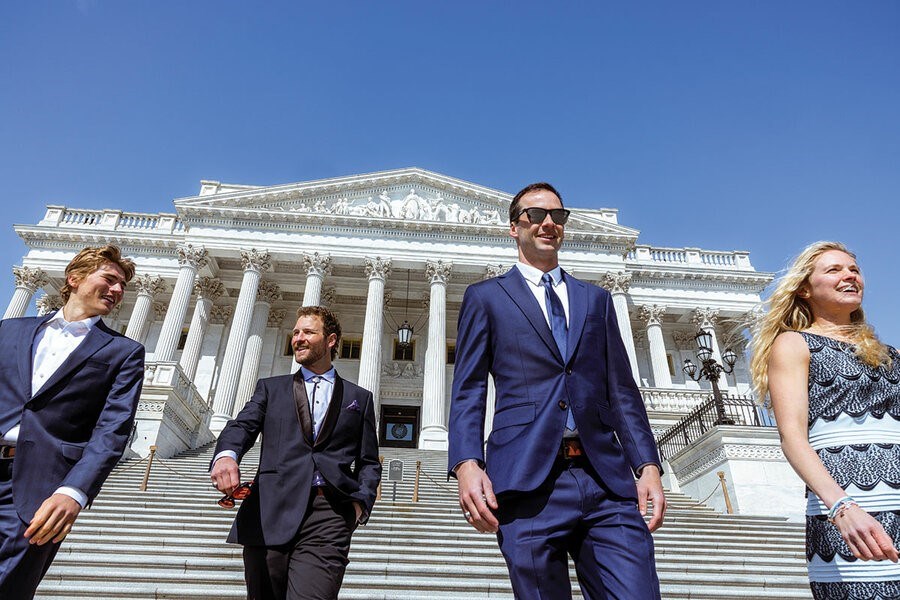 Micheli Oliver/POWOlympians (from left) Gus Schumacher, Wiley Maple, Troy Miller, and Jessie Diggins bring inspiration and urgency for action to Capitol Hill in April 2022.
Micheli Oliver/POWOlympians (from left) Gus Schumacher, Wiley Maple, Troy Miller, and Jessie Diggins bring inspiration and urgency for action to Capitol Hill in April 2022.
Rep. Kelly Armstrong of North Dakota, the third-highest oil-producing state in the country, said that initially some in the energy industry saw the caucus as an effort to appease advocates for climate change mitigation.
“They worried it’s a bunch of squishy moderates who are going to make their job harder,” says Mr. Armstrong, who grew up in the oil business. Now, they don’t feel that way, he says, thanks to Mr. Curtis. “I think that’s a testament to how well he has done.”
To be sure, there are still many divisions to bridge. Democrats and climate activists have criticized the Conservative Climate Caucus as an organization that distracts from the hard, emissions-reducing work that needs to happen to reduce global warming; they disagree strongly with the caucus’ stance that fossil fuels are part of the solution to a cleaner future.
The caucus receives funding for travel and speakers from conservative-leaning energy groups such as Citizens for Responsible Energy Solutions and ClearPath Foundation; progressives say these groups are greenwashing tools for the oil and gas industry.
But the caucus’ “rational environmentalism” stance has also helped Mr. Curtis build a broader base of support. When redistricting brought a big fracking area into his constituency, for instance, he went to visit and was met with skepticism. “Oh, you’re the climate guy,” he recalls them saying. But rather than lecture about the dangers of fossil fuels, he told workers and supervisors that he believed they were part of the solution. Several visits later, his staff says, he got a standing ovation at a chamber of commerce event.
Citizens’ Climate Lobby (CCL), the nonpartisan group that has joined Mr. Curtis for hikes, has actively sought to build support among Republicans, including all six members of Utah’s delegation. But they’re looking to move Democrats, too, toward legislation they believe can actually pass – and not be overturned when control flips to the other party.
“We view the future of climate legislation as being bipartisan,” says Mr. Moyer, the CCL state coordinator, noting that three of the past four major climate bills Congress passed, including 2021’s bipartisan infrastructure law, had support on both sides of the aisle. So did some smaller bills that CCL helped shape and Mr. Curtis supported.
In this Congress, CCL is focused on permitting reform.
“Nobody’s going to have their perfect bill here,” Mr. Moyer says. “But can we find common ground on that topic?”
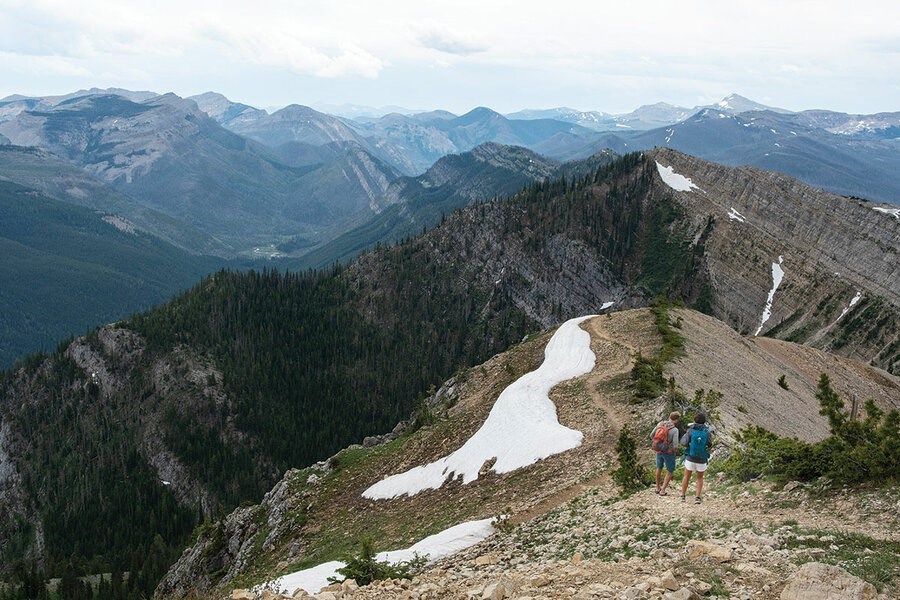 Alfredo Sosa/Staff/FileHikers Ryan Witkowski and Claire Mannheimer start their trek down Patrol Mountain after visiting the wildfire lookout tower in Montana’s Bob Marshall Wilderness on July 9, 2022.
Alfredo Sosa/Staff/FileHikers Ryan Witkowski and Claire Mannheimer start their trek down Patrol Mountain after visiting the wildfire lookout tower in Montana’s Bob Marshall Wilderness on July 9, 2022.
That is what Mr. Smith, the ski resort entrepreneur, believes.
After spending years as the executive vice president of Merrill Lynch, in 2001 he purchased and for nearly 20 years ran Sugarbush Resort in Vermont.
“As an owner of a ski resort, I was getting increasingly concerned about climate change,” he says. He noticed the weather becoming more volatile and the season shifting. Resorts were having to spend more money on snow-making, an activity that some environmentalists say exacerbates the problem in the first place because of the energy involved.
But as a lifelong moderate Republican, recently turned independent, Mr. Smith also saw the climate crisis as a place where people of different political backgrounds could start to collaborate – especially if they kept the focus on common goals. For him, this meant safeguarding skiing for generations to come and also increasing energy efficiency.
“It’s hard to argue against that because it makes economic sense for businesses,” he says. “I mean, there’s still a political divide. Obviously, the conservative Republicans are a lot less concerned about climate change. But I think even they are beginning to see it because it impacts their economies. I think people are beginning to wake up and say, things are changing.”
There are indeed signs that Americans are shifting back to a more unified position on climate change. Climate communications researchers at Yale and George Mason Universities found as much last year. Their December survey of Americans’ attitudes about global warming shows that 70% of Americans today think global warming is happening, up from 57% in 2010, and only 16% say it is not happening. (The other 14% say they don’t know, but usually say “yes” rather than “no” when asked to give their best guess.)
There is still a significant divide between Republicans and Democrats – more than 80% of conservative Democrats report being worried about climate change, while a consistent 23% of conservative Republicans do the same. But a growing number of younger and more moderate Republicans are expressing both concern about climate change and a desire for policymakers to address it, according to another of the researchers’ surveys.
Part of that, researchers theorize, is because Americans are increasingly likely to experience the impact of climate change directly, or to absorb the stories of other people experiencing it.
And perhaps nowhere is this more apparent than in the outdoors.
Crystal Raymond, a climate adaptation specialist at the University of Washington, has studied the impact of climate change on outdoor activities in the Northwest. Skiers were the first group to notice changes, she says. There is simply less snow in the Northwest – about a 30% decline in average spring snowpack since the early 20th century. With temperatures an average of 2 degrees Fahrenheit warmer since the turn of that century, the snowstorms that hovered just below 32 degrees now come as rain.
The shift in snowpack literally has trickle-down results. It affects river flow and trail erosion. There are also increasing numbers of wildfires, which impact mountain biking and hiking. People realize that campfire s’mores are unlikely to be part of their family traditions for much longer; it’s getting to be too dangerous to have an open flame.
“We see a heightened awareness here,” Dr. Raymond says.
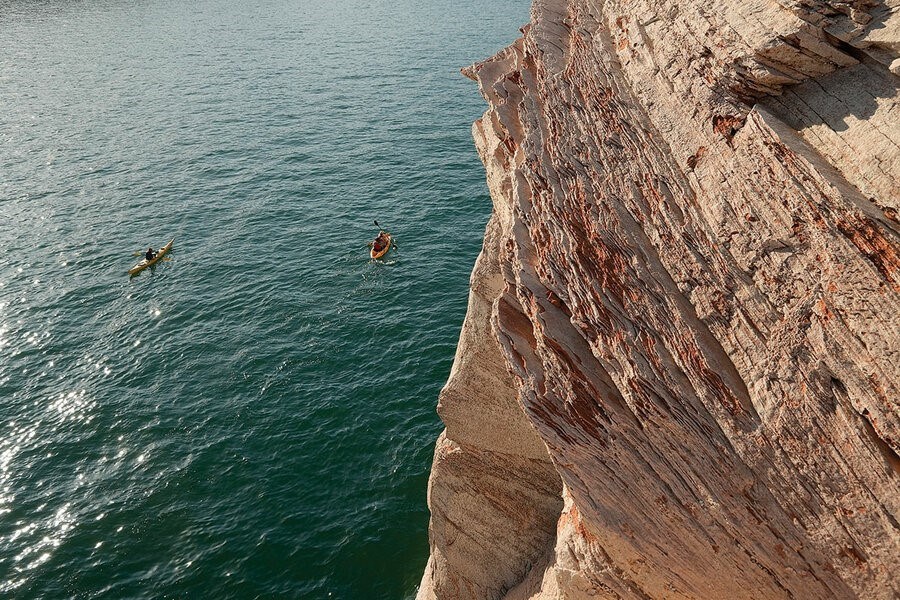 Brittany Peterson/AP/FileKayakers paddle past bathtub rings showing how low Lake Powell is, June 7, 2022, in Page, Arizona.
Brittany Peterson/AP/FileKayakers paddle past bathtub rings showing how low Lake Powell is, June 7, 2022, in Page, Arizona.
And that awareness has opened doors for more storytelling and activism – which, in turn, leads to greater climate awareness.
In 2020, the Yale and George Mason researchers studied the impact of a radio story featuring a North Carolina sportsman named Richard Mode, who talked emotionally about the effects of climate change on his favorite places to hunt and fish. The researchers found that the story increased global warming beliefs and risk perception among conservatives who heard it.
Mr. Cramer, of Outdoor Alliance, says that for many years, some of the conservation groups that are part of his network saw climate as a bit too controversial – a topic that could derail bipartisan work on land preservation or other environmental issues. That has changed, he says.
“With climate there’s been this crescendo of relevance,” he says. “In the beginning, there was the question of ‘What are the opportunity costs of getting involved in climate? Should that be left to other organizations?’ But over time the connection between climate and outdoor experience has become clear. We don’t get a lot of pushback anymore.”
For kayakers like him, and others who gather to do outdoor activities together, the love of place naturally evolves into a desire to care for that environment, he says.
“And if you’re thinking primarily about conserving and protecting a place, it’s difficult to keep that perspective without thinking about climate,” he adds.
In other words, place ends up mattering a lot more than politics. And when millions of people spend time outdoors caring about place, that matters. Protect Our Winters (POW) estimates what it calls the “Outdoor State” to be some 50-million-people large.
“Given the connection and time spent in the great outdoors, they’re the best group to advocate about policies connected to climate change,” says Ms. Bourgoine with POW.
For her part, Ms. Hutcheson decided years ago that part of her job as a river guide was to talk to her guests about climate.
After all, people from around the country come to fish with her – liberals and conservatives and everyone in between. They all experience the landscape together: the sparkling waters and big blue sky and snow-peaked mountains, the sound of the river and the adrenaline of hauling in a catch. And then, she says, they begin to care.
“When they come out with me, it’s a natural progression to become a climate activist,” she says. “You can’t enjoy it and take it and feel good about the taking without giving anything back. Most people leave and think, ‘What can I do? What is my role and responsibility here?’”
That’s true, she says, across the political spectrum.
“It’s not like there’s an outdoors for Democrats and an outdoors for Republicans,” she adds.
Stephanie Hanes reported from Northampton, Massachusetts. Christa Case Bryant reported from Washington, D.C.
Related stories
Page created on 4/5/2023 4:43:33 PM
Last edited 4/5/2023 5:30:10 PM
